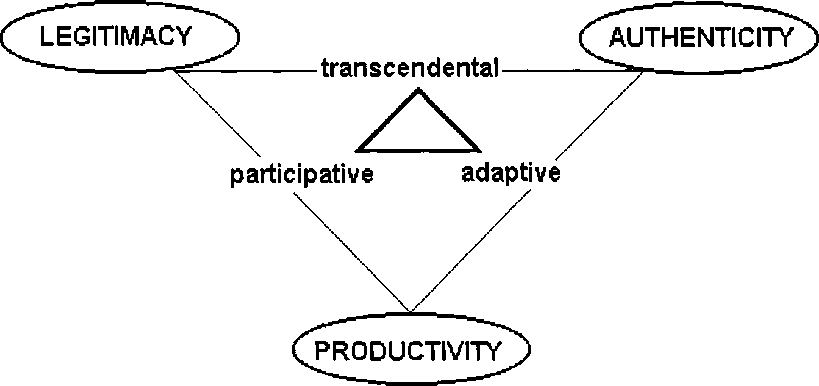mind for culture-changing processes. These are: authenticity, legitimacy and
productivity. They are necessary, according to Thelen, to “optimize the dialectical
processes among (the) three components” (ibid,85) that characterised human beings-as-
Ieamers. Thelen understands these values, or conditions, with specific connections to the
three paradigms which, in turn are intrinsically connected (Fig. 8.1). Thus, being
adaptative, depends, among other things, on the authenticity and productivity of the
learning situation in which one is involved. Being participative can be induced by
legitimate and productive conditions and authenticity, in combination with legitimacy,
can contribute to transcendental experiences in the individual. Let me now elaborate on
these three conditions and analyse them in relation to self-direction in language learning.

Fig 8.1 Conditions for creating a learning culture (based on Thelen;1981)
8.1.2.2.1 Authenticity
Authenticity relates to personal meaning. According to Thelen, it enhances the
dialectical interaction between adaptation and transcendence, i.e., what I am as a given
and as a becoming.
An activity is authentic for a person when he feels emotionally
‘involved’ and mentally stimulated; when he is aware of choices
and enjoys the challenge of making decisions; when he feels he
has something to bring to the activity and that its outcome will be
important for him; when it has the quality of ‘life’ and is not
Comparmentalized or merely a game; when through the activity new
relationships develop among his thoughts, attitudes and action tendencies;
when his internalized culture...undergoes reconstruction, (ibid,86)
255
More intriguing information
1. Place of Work and Place of Residence: Informal Hiring Networks and Labor Market Outcomes2. Ein pragmatisierter Kalkul des naturlichen Schlieβens nebst Metatheorie
3. Regulation of the Electricity Industry in Bolivia: Its Impact on Access to the Poor, Prices and Quality
4. LOCAL PROGRAMS AND ACTIVITIES TO HELP FARM PEOPLE ADJUST
5. The effect of globalisation on industrial districts in Italy: evidence from the footwear sector
6. Nonparametric cointegration analysis
7. An Attempt to 2
8. Popular Conceptions of Nationhood in Old and New European
9. Three Strikes and You.re Out: Reply to Cooper and Willis
10. The name is absent